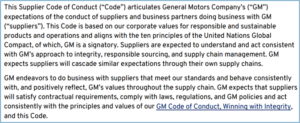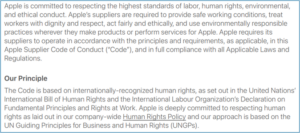3 Reasons Why Suppliers Must Get Serious About ESG Reporting Now
If regulations don’t mandate reporting, then your customers will.
Despite recent backlash against ESG, any company that plays a role in another organization’s supply chain can expect to face ESG reporting requirements or requests soon. Thus far, it’s been possible for many suppliers to fly under the radar even though interest in the environmental and social impacts of corporate supply chains has been an area of focus for socially responsible investors, environmental advocates, human rights activists, and others for decades.
Now, companies, regulators around the globe, and even ratings agencies, are playing a part in advancing the issue and requiring suppliers to be more forthcoming with information. Suppliers of all sizes and in all industries are seeing notable growth in direct requests for environmental and social policy and performance information from their clients and/or facing new official compliance requirements, neither of which can be easily ignored.
No supplier is exempt.
Public or private, large or small, all suppliers need to be aware of their environmental and social footprint and establish ESG strategies and programs that will help meet today’s ESG-related management and reporting expectations. Here are the top three reasons why:
1. New and forthcoming laws and regulations in the US and abroad require companies to look more closely at their suppliers
Regulators are putting pressure on public companies to understand their supply chains. Public companies, in turn, are asking suppliers to deliver that information posthaste.
In the US:
- The SEC’s proposed climate-related disclosures rule for public companies includes requirements for organizations to report climate-related risks and emissions data, including material Scope 3 emissions that come from a company’s supply chain.
- The proposed Federal Supplier Climate Risks and Resilience Rule will require major contractors to disclose environmental data including Scope 3 emissions, climate risks, and set emissions reduction targets. With the US Federal Government representing the single largest purchasing organization in the world, the proposed rule would have far-reaching effects for companies and suppliers.
In the EU:
- The Corporate Sustainability Reporting Directive (CSRD) amends and significantly expands on the EU’s existing Non-Financial Reporting Directive (NFRD) in terms of the number of companies affected and the scope of reporting. Expected to impact nearly 50,000 EU companies and another 10,000 outside of the bloc, the rules will also require an estimated 3,000 US-based companies with significant operations or subsidiaries within the EU to disclose. Since the CSRD places added emphasis on disclosures covering the impacts of a company’s entire value chain, US suppliers can fully expect a substantial increase in the number of EU customers pushing for compliance with upstream information requests – this is in addition to the prospective 3,000 US companies with direct CSRD reporting obligations.
- The proposed Corporate Sustainability Due Diligence Directive (CSDDD), when enacted, will require companies to carry out environmental and human rights due diligence throughout their supply chain, both inside and outside of Europe. Like the CSRD, the CSDDD would also require non-EU companies to comply with the law if they meet the EU revenue threshold of $165 million. The threshold drops to approximately $44 million for companies with at least 50% of revenue generated in a high-risk sector such as agriculture, textiles, or minerals. The CSDDD is expected to potentially impact approximately 4,000 non-EU companies.
In Germany:
- The Supply Chain Due Diligence Act (SCDDA) places due diligence obligations to comply with environmental and human rights standards in the supply chain on companies with German operations that meet the employee threshold. Companies subject to the act must also establish due diligence procedures to ensure adherence among suppliers. These procedures include risk management systems, remediation measures, and an annual public reporting requirement for suppliers.
In Canada:
- As of April 1, 2023, major government suppliers are compelled to disclose greenhouse gas emissions and set reduction targets.
- New emissions-reduction standards for products used in federal construction projects focus on utilizing lower-carbon concrete with plans to expand to other construction materials such as aluminum, steel, and wood.
2. Corporate supplier policies are becoming the norm and can be significant in scope
It is not uncommon for companies with significant supply chain operations to adopt and implement supplier policies that address corporate values and adherence to international norms, standards, and conventions. Such policies are especially common at larger companies with international operations as well as those with operations in sectors with a history of relatively higher risks, such as mining and metals or agriculture.

General Motors Supplier Code of Conduct

Apple Supplier Code of Conduct
While some companies’ policies address only Tier 1 or primary suppliers, other companies may extend the compliance requirements further down the supplier chain to Tier 2 or Tier 3 suppliers. In these instances, the Tier 1 suppliers are often assigned responsibility for maintaining compliance on a company’s behalf.
Many times, corporate supplier policies include enforcement mechanisms such as self-administered questionnaires, corporate risk assessments and analytics, and announced or unannounced on-site audits by internal compliance team members or third-party service providers. The consequences for non-compliance with supplier policies varies from company to company and can reflect factors such as severity of the violation, first time violation vs. repeat violation, and any remediation that has been undertaken to address the violation.
3. Sustainability ratings provider EcoVadis is bringing greater assessment capacity to the market
Not only are new supply chain-related ESG regulations and policies increasingly common, they are also increasingly easy for companies to enforce, thanks in part to the impact of EcoVadis, a supply chain ESG ratings firm that provides a platform for companies to more easily compare and monitor their large supply chain networks.
EcoVadis is not an especially new company—it was founded in 2007—but its profile and assessment capacity have increased substantially in recent years, no doubt assisted by significant external funding – at least $760 million since 2020. To date, EcoVadis has rated more than 107,000 companies, often smaller, private companies that receive requests from their large customers to use the platform. EcoVadis says that 945 companies currently use their solutions to assess and track supplier and partner sustainability performance. The company’s goal is to make sustainability reporting, ESG scorecards, and ESG improvement plans part of every company’s future.
Some suppliers will feel more ESG pressure sooner than others
For some suppliers, increased disclosure will be a matter of necessity to comply with legislation and regulation, particularly those companies with significant assets, revenue, or operations linked to the EU. For many other suppliers, the need to comply with customer expectations will drive the adoption of ESG policies, ESG strategies, and ESG performance reporting.
However, the impact of new regulations and heightened expectations will not fall evenly across all industry sectors, at least not at first. Manufacturing companies and extractive industry companies, already familiar with supply chain ESG risk management, will feel the effects most acutely. Any company that is part of the supply chain for consumer products, apparel/footwear, or any other sector that has a significant intersection between brand risk and consumer perception will also likely be the target of additional disclosure requests.
In the long term, all suppliers should expect to report on ESG
The shift in expectations of corporate behavior and transparency has been too great, among too many constituencies, and in too many markets for any company’s ESG management practices, or lack thereof, to avoid scrutiny for long. Preparing now is the best way for any supplier, in any industry or of any size, to be ready to share its story when the time comes.
Questions about your supply chain? Reach out.
If you are a supplier needing support in responding to EcoVadis or establishing foundational ESG policies and programs, or a company interested in evaluating your supply chain’s sustainability, contact us. We can help prepare your organization for any supplier sustainability reporting requirements.

